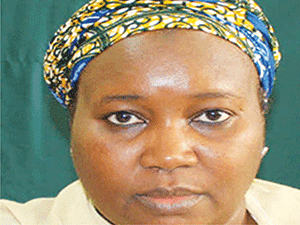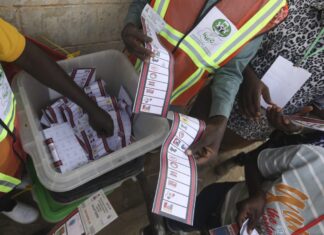The 2015 general elections cost precisely N114,058,943,747.48, the post-election report by Independent National Election Commission (INEC) has declared.
Of the total cost, Federal government spent N108.9bn, and the estimated assistance from development partners was N5,207,260,433.55.
The N5.2 billlion from development partners came as sponsorship of workshops, seminars, conferences, enlightenment programmes and engagement of consultants.
The report, was unveiled in Abuja on Wednesday by the acting INEC chairperson, Mrs. Amina Bala Zakari, who once again noted that the decision of former president Goodluck Jonathan to concede power lent credibility to the 2015 presidential election result.
In addition, INEC further made a case for e-voting in future elections, and for the establishment of Electoral Offences Commission and Tribunal.
The 232-page document with nine chapters, according to INEC, is the first time in Nigeria that the report is produced three months after an election.
The report said: “More specifically, the 2015 general election was funded from two major sources, the consolidated national budgetary appropriation and assistance from development partners.”
However, according to a breakdown of the funds appropriated for the polls, N14bn was appropriated for ad hoc staff honorarium, transport for ad hoc staff was N4.6bn, feeding of security officials was put at N1.8bn, while feeding of election officials was N1.25bn.
The presidential/governorship/runoffs/other rescheduled elections got N15.7bn while N2.5bn was appropriated for procurement of utility and special utility vehicles.
The cost of ballot papers was put at N8.4bn, and ballot boxes at N5.02bn. N1.68bn was appropriated for voting cubicles, while insurance for INEC staff and ad hoc staff got N1.2bn.
The report further revealed that the monitoring of political primaries got an appropriation of N600m while monitoring of elections (local and overseas) got N500m.
While the continuous voter registration cost N4.5bn, the smart card readers (SCRs), training and mock elections to test SCRs got N4.179bn. Electoral services-wide vote got N2.5bn while professional fees and expenses for external solicitors got N2.4bn.
In a breakdown of funds from development partners, INEC said it was supported with $21,316,005 and £209,9000, totalling about N5,207,260,433.55 – to enable the commission to fund the 2015 general elections.
The amount was pooled from the Ford Foundation, United Nations Development Programme (UNDP), European Union (EU), the International Foundation for Electoral System (IFES) and the Open Society Initiative for West Africa (OSIWA).
The grants were targeted at specific electoral programmes aimed at promoting the successful conduct of the elections.
Some of the grants include: $1 million grant by Ford Foundation for Business Process Re-design (BPR) and Voter Education.
The UNDP gave a grant of $1,073,005.67 for election management system (EMS) and training for security officials; another $17,552,236 for sponsorship of INEC’s engagement with relevant and strategic stakeholders, etc.
OSIWA gave a grant of $84,764.00 to INEC for the prosecution of electoral offences and gazette of electoral regulations.
Civic Education and Election Monitoring, through the Yar’Adua Centre, was funded by a grant of $1.6m from the Mac Arthur Foundation.
Another €209,900 for preventing conflict and electoral violence support to INEC came from International IDEA.
The Commission said the monies were converted at the prevailing exchange rate of N165 and N200 per dollar and Euro respectively.
Explaining why the presidential result was credible, the report said, “What stood out, in bold relief, about the 2015 general elections is that, for the first time since 1999, the outcome of the presidential election, held on March 28, 2015, was uncontested in court. This can be transparent and credible. And, secondly, the historic concession made by the incumbent president, even before the official declaration of the presidential election result by the commission.”
Furthermore, the operations and logistics, amendments of legal framework and voter education and publicity were challenges that confronted INEC in the discharge of its duties.
“In spite of the conscious efforts by the Commission to address the perennial challenges of logistics and to ensure that men and materials arrived at polling units (PUs), to allow for opening of polls before or at 8am across the country, this did not occur in some PUs, especially on March 28, 2015, the date of the presidential election and National Assembly Elections.
“The Memorandum of Understanding (MoU) entered into with the National Union of Road Transport Workers (NURTW) was observed more in the breach.
“Some of the state offices did not activate their Registration Area Centre (RACS) and Super RACS, as directed by the commission. These two challenges led to the late commencement of polls in some PUs and threatened the integrity of the elections, in spite of the patience, understanding and resilience Nigerians demonstrated on election day.”
INEC lambasted National Assembly for failure to update election laws adding that up to the 2015 elections, certain legal amendments were not effected and the commission had to conduct the elections with laws that were overdue for refinement or outright amendment.
Zakari pointed out the sharp decline in the number of petitions.
“The number of election petitions after the 2007 general elections stood at 1,290; after the 2011 general elections, the number came down by almost half, with a total of 732 election petitions filed; following the 2015 general elections, the number of petitions further scaled down to 611. It is therefore expected that the incidence of nullified elections will be correspondingly low,” Zakari said.
In a goodwill message by the UNDP official, Opia Mensah, he hailed the commission for seeing to the first transfer of power from a ruling party to the opposition in Nigeria, adding that the 2015 exercise was a concerted effort by INEC and its partners.
He said INEC did not rest on its oars after 2011, as it took up the process to improve the elections through system audit, development of four-year plan, restructuring, voter register, voter cards and biometric registration system. All of them were directed to ensue free and fair polls to reflect the will of the Nigeria people.
He noted that the report will serve as reference point for future elections.
“If you don’t tell your story, someone else will choose to tell it. I believe that the high standards will be sustained and consolidated for the benefit of the citizens of Nigeria,” he stated.
-Leadership














